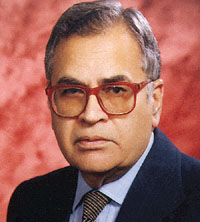
To promote research in physics and strengthen university capability in Pakistan, a National Centre for Physics (NCP) has been established at Quaid-i-Azam University, Islamabad. The director is distinguished theorist Riazuddin and the scientific activities formally began with a one-day symposium on 28 January.
The NCP will try to attract world-class physicists to the Centre throughout the year. Its basic mode of operation will be based on distinguished visiting scholars for periods ranging from a week up to a year.
The NCP will be a permanent focus for workshops, colleges, schools, conferences and seminars covering physics, mathematics and related subjects, and will encourage joint efforts in the relevant departments, institutions, and organizations in Pakistan.
The NCP will also enter into collaborative arrangements with institutions abroad, like CERN and the Abdus Salam International Centre for Theoretical Physics in Trieste.
The strong influence of the late Abdus Salam endowed Pakistan with a distinguished tradition in theoretical physics, and many Pakistani theorists hold important positions in overseas universities and research centres. Recently this tradition has extended to cover also the experimental sector, where Pakistani physicists are involved in the CMS experiment for CERN’s LHC proton collider.
The NCP will also try to use effectively expatriate Pakistani physicists by appointing them as “reverse” associates to enable them to spend some time every year at the Centre.
The Centre is also a natural development of the International Nathiagali Summer College, established in 1976 at the suggestion of Salam and which has been held annually ever since. The twin topics of this year’s school are CERN’s LHC collider and its research programme, and Non-Conventional Energy Resources.
NCP Director Riazuddin took his first research steps under Abdus Salam at Lahore and in the UK, obtaining his PhD in 1959 at Cambridge. After positions in Pakistan and in the US, in 1966 he became founding director of the Institute of Physics at the then new University of Islamabad, which gave Pakistani physics a research base in its own country. The institute is now a department of Quaid-i-Azam University. In 1982 he joined King Fahd University, Dhahran.







